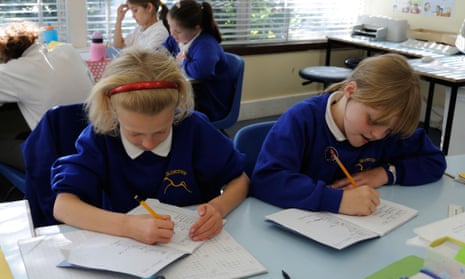A group of acclaimed children’s authors including the UK’s newest Carnegie medallist Tanya Landman is preparing to contact the education secretary about the “very damaging” tendency for primary school teachers to steer children’s creative writing towards “too elaborate, flowery and over-complex” language to meet assessment criteria.
The authors, a growing group that already numbers 35, say that national curriculum assessment criteria have become a “prescription for how to teach children to write (to pass the tests), with quite adverse effects on their writing skills”. This means, they say, that children are taught “not to use simple words such as ‘good’, ‘bad’, ‘small’ or ‘big’ but to always find other more ‘interesting’ words to replace them – such as ‘wonderful’, ‘terrible’, ‘minuscule’ or ‘enormous’”.
They “are also taught never to use ‘and’ or ‘said’ if they can shoehorn in ‘additionally’ or ‘exclaimed’, and are encouraged wherever possible to use personification, metaphor, similes and subordinate clauses”, say the writers, who also include Carnegie medal winner and bestseller Tim Bowler, with other names in children’s fiction including Sophia Bennett, Mary Hoffman, Lydia Syson and Katherine Langrish.
The more complicated words are presented as “better” alternatives to children, the authors write in an open letter that they are preparing to send to the education secretary Nicky Morgan next week, so they “fail to understand the nuances of their use, and they also fail to realise that they are relatively unusual”, and that “they are used sparingly in good writing”.
Cecilia Busby, who writes fantasy adventures for children as CJ Busby, is spearheading the protest, and said her concerns about the teaching of creative writing were sparked a few years ago, when she was reading out a description of her character Sir Bertram Pendragon from her novel Frogspell to a year six class at a Devon primary school. “He is a gruff, burly knight with a deep voice and a large moustache who also happens to enjoy whacking his enemies with his big sword,” she told the class, only to be stopped by the teacher, who told her that “the word ‘big’ is one of the banned words in our classroom”.
“It’s been bugging me for a while,” she said. “I’ve just done a really big creative writing project with a group of local schools, and all the teaching assistants are constantly asking the kids, ‘can you think of a longer word?’, ‘can you say this in a way that’s more interesting?’ And it just results in this awful flowery language.”
The way writing is taught in primary schools, she said, is the opposite of how it is taught in MAs in creative writing, “where you’re taught to strip out the adverbs, remove all adjectives, and write in a simple, direct way”.
“I finally thought I need to do something about this,” she said. “At the moment we have 35 names, and most people I’ve talked to have said they agree, including a lot of teachers. If you look at the national curriculum descriptions, they are picking up on something that happens to children’s writing as it develops – vocabulary becomes more complex, and sentence structure becomes more complex, so in that sense there is nothing necessarily wrong with what they’re saying. The problem comes when you try to turn that into a marking scheme, which says you get more marks for an unusual word than a usual word, or a sentence with a subclause rather than one without.”
And there is so much emphasis, Busby said, on getting children to use more complex language, “that there’s no time to encourage kids to read more, or talk more, and that’s where more complex structures get embedded in a real way”.
Author and poet John Dougherty, current chair of the Society of Authors’ children’s writers and illustrators group, is a signatory to the letter, and agreed with Busby. “What tends to happen is that children are taught this is what good writing is, and it completely ignores the essence of good writing, which cannot be measured on a scale,” he said. “We’re teaching them it means stuffing writing with adjectives, rather than that good writing is about communication, and will vary depending on what you’re trying to communicate, what kinds of emotions you’re trying to stir up, what kind of character you’re trying to put into their minds.”
The letter says the approach in primary school “has knock-on effects on … writing at secondary school and has been noticed by some of us in students at university level”. The authors urge the government, Ofqual and the Standards and Testing Agency to “make it quite clear to teachers and assessors that complex vocabulary, figurative language and complicated sentence structures should be used with caution and their use should always be subordinate to good, clear and fluent style”.
Otherwise, the authors write: “We risk producing a generation of children who believe that a sentence such as ‘I bounded excitedly from my cramped wooden seat and flung my arm gracefully up like a bird soaring into the sky’ is always better than ‘I stood and put my hand up’.”

Comments (…)
Sign in or create your Guardian account to join the discussion